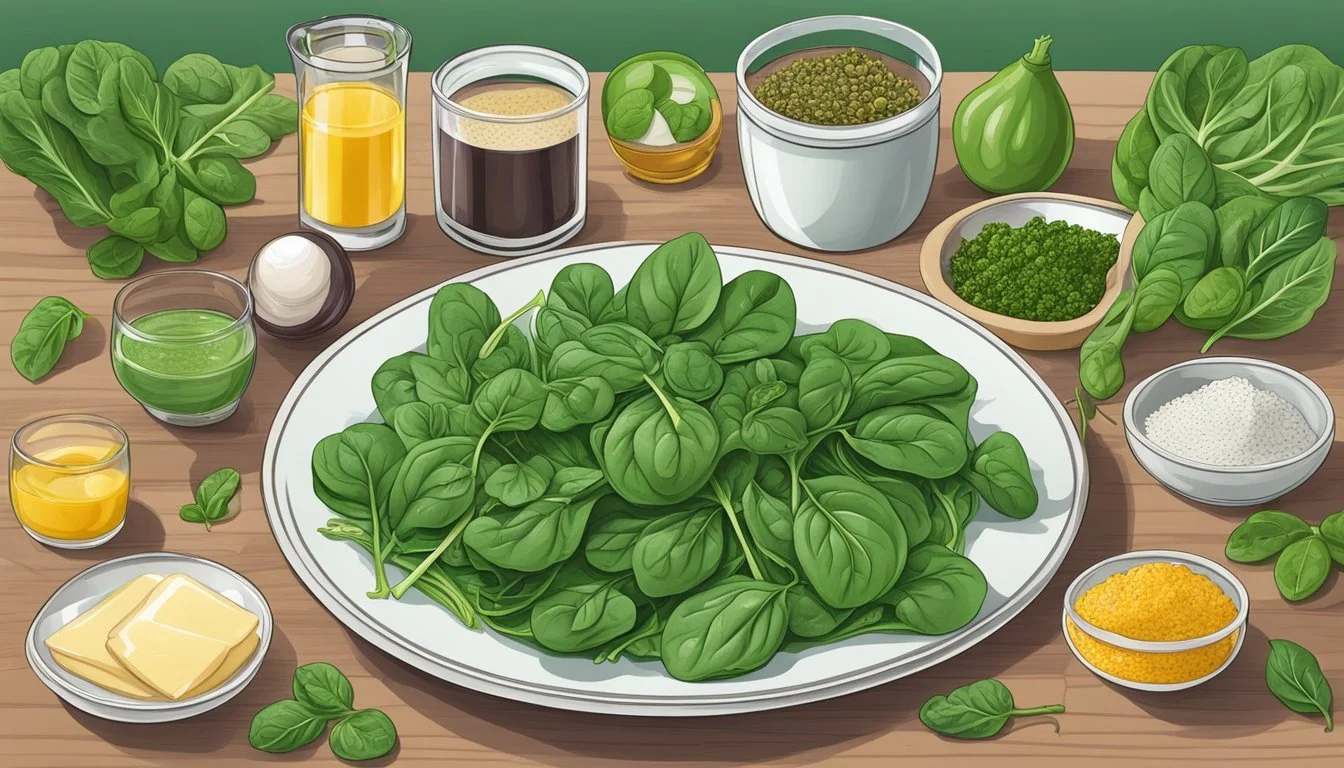10 Foods That May Help Boost Testosterone Naturally
Boost Your Hormone Levels Naturally
Maintaining optimal testosterone levels is crucial for overall health and well-being. Individuals often seek natural methods to boost their testosterone, and dietary choices play a significant role in this endeavor. A variety of foods can influence hormone production, supporting a balanced and healthy lifestyle.
Incorporating specific foods into one's diet can naturally enhance testosterone levels, promoting vitality and energy. This article explores various foods that can help boost testosterone, providing valuable insights for anyone looking to optimize their hormonal health.
1) Tuna
Tuna is an excellent source of high-quality protein and key nutrients, making it a beneficial food for those looking to boost their testosterone levels. It contains significant amounts of vitamin D, which plays a crucial role in hormone production.
A single serving of tuna provides about 10% of the daily magnesium requirement. Magnesium positively influences testosterone levels and is essential for overall hormonal health.
Tuna is lean, which means it's a great protein source without adding excessive calories. Protein-rich diets have an association with maintaining healthy testosterone levels.
Incorporating tuna into meals can therefore support muscle mass and strength, important for overall well-being.
2) Egg Yolks
Egg yolks are a potent source of essential nutrients that support testosterone production.
They contain zinc, which is vital for maintaining optimal testosterone levels. A diet deficient in zinc may lead to reduced testosterone levels.
Vitamin D, another nutrient found in egg yolks, plays a crucial role in hormone regulation. Studies have shown that vitamin D deficiency can negatively impact testosterone levels.
Cholesterol is also present in egg yolks, which is important as it is a building block for testosterone synthesis. Eating eggs can be part of a balanced diet to help support hormone health.
Egg yolks also provide protein, necessary for muscle repair and growth. Maintaining adequate muscle mass can be beneficial for overall hormone balance.
Including egg yolks in the diet can be a simple way to ensure sufficient intake of these important nutrients.
3) Beef Liver
Beef liver stands out as a highly nutritious option for those looking to boost their testosterone levels. Rich in essential nutrients, it is particularly noted for its high vitamin A content. Vitamin A has been shown to increase the concentration of Leydig cells, which play a crucial role in testosterone production.
Alongside vitamin A, beef liver also contains significant amounts of cholesterol. Cholesterol serves as a precursor to testosterone, supplying the raw materials needed for its synthesis. Including cholesterol-rich foods like beef liver in your diet can potentially support hormone balance.
Beef liver's nutrient profile doesn't stop at vitamin A and cholesterol. This organ meat is also packed with vitamins B6, B9, and B12, which can further aid in hormonal health. These vitamins support the overall well-being of the body, contributing to optimal testosterone levels.
Consuming beef liver should be done thoughtfully, as it is potent. While it offers many benefits, moderation is key to avoiding potential adverse effects related to excessive intake. Incorporating beef liver wisely into a balanced diet can help maintain healthy testosterone levels.
Beef liver is undeniably a powerhouse of nutrients, perfectly suited for anyone aiming to support their hormonal health.
4) Oysters
Oysters are renowned for their high zinc content, a mineral essential for boosting testosterone levels. Zinc plays a critical role in regulating the production of testosterone by stimulating hormone release and maintaining overall reproductive health.
A single 3-ounce serving of oysters can provide up to 74.1 milligrams of zinc. This significantly exceeds the zinc content found in most over-the-counter supplements, making oysters an effective natural source.
Consuming oysters may also improve skin, hair, and joint health due to the zinc content. Adequate zinc levels help in wound healing and support the maintenance of healthy skin.
In addition to zinc, oysters are low in calories and rich in protein, healthy fats, and essential vitamins and minerals, contributing to overall health. Their nutrient density makes them not only beneficial for testosterone levels but also a nutritious addition to a balanced diet.
Integrating oysters into meals can be an enjoyable way to boost testosterone naturally. They can be eaten raw, grilled, or added to various dishes, accommodating different culinary preferences.
5) Fortified Cereals
Fortified cereals are a convenient option for increasing dietary intake of essential vitamins and minerals.
When cereals are fortified, nutrients like vitamins D, B6, and B12 are added. These vitamins are known to support the body's testosterone production.
It's important to choose cereals with low sugar content to avoid unnecessary calories.
Many fortified cereals also provide significant amounts of zinc and magnesium, which are crucial for maintaining healthy testosterone levels.
For those looking to boost their intake, combining these cereals with other nutrient-dense foods can be beneficial.
A breakfast bowl with fortified cereal, nuts, and a serving of fruit can be an excellent start to the day.
6) Shellfish
Shellfish are a rich source of essential nutrients that support the body's testosterone production.
Oysters stand out due to their high zinc content. Zinc is crucial for testosterone synthesis and overall hormonal balance. Oysters also provide essential vitamins like B12 and minerals such as selenium, which further reinforce their benefits.
Crab and lobster are other excellent shellfish choices. They are packed with zinc and contain vitamin B12, aiding in testosterone regulation.
Clams and mussels offer similar benefits. They provide a mix of zinc, selenium, and omega-3 fatty acids, all vital for maintaining healthy testosterone levels.
Incorporating a variety of shellfish into one's diet can ensure an adequate intake of these nutrients, supporting optimal testosterone production.
7) Spinach
Spinach stands out as a valuable food for boosting testosterone. This leafy green is packed with magnesium, a mineral crucial for testosterone production.
Studies indicate that magnesium can help raise levels of free testosterone in the blood by reducing sex hormone-binding globulin (SHBG).
Besides magnesium, spinach also contains zinc. With one cup of cooked spinach providing around 1.37mg of zinc, it contributes to maintaining proper testosterone levels.
Vitamin D presence in spinach further supports testosterone production. Low vitamin D levels are linked to reduced testosterone.
Spinach also contains phytoecdysteroids, which may enhance muscle strength and mass. These compounds can indirectly support higher testosterone levels, contributing to overall health and fitness.
8) Almonds
Almonds are a favorable option for those seeking foods high in testosterone-boosting nutrients. Rich in magnesium, zinc, and vitamin E, these nuts contribute to overall health and testosterone production.
Magnesium is essential for various bodily functions, including muscle relaxation and nerve function. Studies link magnesium-rich diets to higher testosterone levels, making almonds a solid addition.
Zinc is another crucial mineral found in almonds. This nutrient plays a significant role in regulating testosterone levels. Adequate zinc intake can help maintain hormonal balance and support reproductive health.
Vitamin E in almonds acts as an antioxidant, protecting cells from damage. This nutrient also supports healthy testosterone levels by reducing oxidative stress, which can negatively affect hormone production.
Incorporating almonds into daily snacks or meals can provide a convenient way to boost essential nutrients.
9) Avocados
Avocados are a nutrient-dense fruit known for their rich content of healthy fats. These fats, particularly monounsaturated fats, support hormone production, including testosterone.
Vitamins K, E, and B6 found in avocados play a crucial role in hormonal balance. These vitamins aid in the body's efficient production and regulation of testosterone levels.
Avocados also provide essential minerals such as magnesium and potassium. Magnesium is linked with higher testosterone levels. Potassium is important for overall health and function of muscles and nerves, indirectly supporting hormonal health.
Additionally, avocados are rich in antioxidants like lutein and beta carotene. Antioxidants help reduce inflammation and oxidative stress, which can support healthy testosterone levels.
Incorporating avocados into meals can be easy and versatile. They can be added to salads, blended into smoothies, or enjoyed as guacamole. Thus, making them a practical option for those looking to naturally boost their testosterone levels.
10) Ginger
Ginger is well-regarded for its potential benefits to testosterone levels. Studies have shown that consuming ginger or ginger extract can have a positive effect on testosterone production.
Research involving hypertensive rats indicated that ginger included in their diet enhanced testosterone levels. This effect is attributed to compounds like manganese found in ginger, which may aid in testosterone production.
Human studies also suggest benefits. For instance, one study found that three months of consuming ginger extract led to increased testosterone levels in participants. Though more research is needed, these findings are promising.
Ginger can be easily incorporated into the diet. It can be added to various dishes for flavor or brewed as a tea. Such versatility makes ginger a convenient option for those looking to potentially boost their testosterone levels.
Understanding Testosterone
Testosterone is a crucial hormone predominantly found in males, though females produce it in smaller amounts. It plays a vital role in the development of male reproductive tissues and secondary sexual characteristics.
This hormone contributes significantly to muscle mass, bone density, and the overall well-being of individuals. Lower levels can lead to various health issues such as reduced libido, fatigue, and decreased muscle mass.
Functions of Testosterone:
Enhances libido and sexual function.
Supports the development of muscle mass and strength.
Contributes to bone density.
Affects mood and cognitive function.
Factors Influencing Testosterone Levels:
Age: Testosterone levels naturally decline with age.
Diet: Nutrients such as zinc and vitamin D are crucial.
Exercise: Regular physical activity, especially strength training, can boost levels.
Sleep: Quality sleep is essential for maintaining optimal hormone production.
Symptoms of Low Testosterone:
Reduced sex drive
Fatigue
Depression or mood swings
Decreased muscle mass
Maintaining proper levels is essential for overall health and well-being. Regular check-ups and a balanced lifestyle can help manage and potentially improve testosterone levels.
Hormonal Balance and Diet
Maintaining hormonal balance is crucial for overall health, especially for men looking to optimize testosterone levels. Key dietary components like proper nutrition and healthy fats play a significant role.
Nutritional Requirements
Certain nutrients are essential for hormone production. Magnesium is pivotal due to its influence on testosterone levels. Foods such as spinach, kale, and beans are rich in magnesium.
Zinc also supports hormonal health. Oysters, beef, and pumpkin seeds provide good sources of zinc.
Vitamin D contributes by aiding hormone regulation. Exposure to sunlight and consuming fortified foods like dairy products can help maintain adequate levels.
Including these nutrients in the diet ensures the body has the essential building blocks for hormone synthesis.
Role of Healthy Fats
Healthy fats are indispensable for hormone production. Omega-3 fatty acids, found in fish like salmon and chia seeds, protect hormonal health by reducing inflammation.
Saturated fats, when consumed in moderation, are necessary for the production of testosterone. Grass-fed beef and coconut oil are excellent sources.
Monounsaturated fats, present in avocados and olive oil, enhance hormone responsiveness and support overall health.
Incorporating these healthy fats into the diet can stabilize hormone levels and improve physical health.
Impact of Lifestyle Choices
Lifestyle choices significantly affect testosterone levels. Proper diet, regular exercise, and sufficient sleep play crucial roles.
Exercise has a notable impact. Weight training and high-intensity interval training (HIIT) are particularly effective. Consistent physical activity helps maintain optimal testosterone levels.
Sleep also affects hormone production. Lack of sleep can lower testosterone. Aim for 7-9 hours per night to support healthy hormone levels.
Stress management is essential. Chronic stress increases cortisol, which negatively impacts testosterone. Mindfulness, meditation, and regular physical activity can help manage stress.
Limiting alcohol intake and avoiding drug abuse is important. Excessive alcohol and substance abuse can reduce testosterone levels.
Obesity is linked to lower testosterone. Maintaining a healthy weight through diet and exercise can improve hormone balance.
Healthy fat consumption supports hormone production. Omega-3 fatty acids, found in fish, nuts, and seeds, are particularly beneficial.
On the other hand, fatty fish, spinach, and other leafy greens contribute to testosterone production due to their high magnesium and zinc content.
A balanced diet rich in vitamins and minerals supports overall health. Including foods high in zinc, like oysters, and magnesium, like leafy greens, can be beneficial.
Lifestyle choices are integral to maintaining healthy testosterone levels. Simple changes can have a significant impact. Regular exercise, a balanced diet, adequate sleep, stress management, and avoiding excessive alcohol and drug use contribute to optimal testosterone levels.









